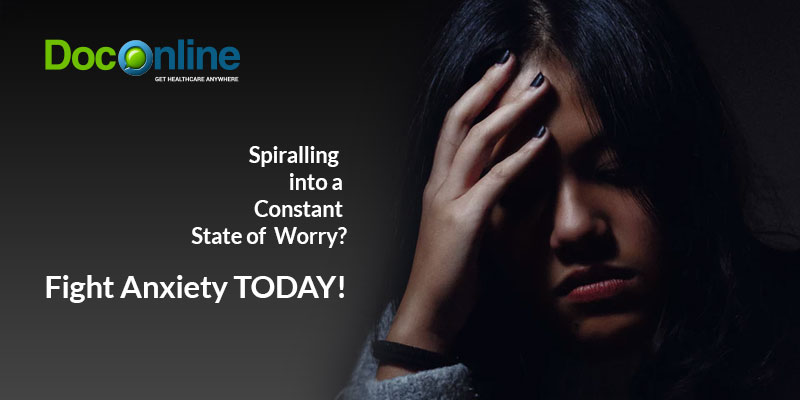Do you worry about appearing for an examination or landing up a job? Do you feel dejected when your romantic relationship is not working out despite your best efforts? Are you embarrassed or get uncomfortable in an awkward social gathering? Do you squirm about paying an unexpected bill and wonder how you will budget for the rest of the month? Well, this realistic fear and feeling of being worried is called everyday anxiety.
Anxiety is a general term for nervousness, worrying, apprehension and fear, which leads to alterations in how one feels and behaves and subsequently gets exhibited through physical symptoms. It can stem from both realistic and unrealistic causes.
While it is normal to feel anxious from time to time, especially in such a stressful life, the flip side is dark and deep, which is called anxiety disorder.
Anxiety disorder is a serious mental health disorder that engulfs the person in feelings of constant worry, fear, and anxiety, so much so that it interferes with the functioning of their daily activities.
WHO estimates that nearly 56 million Indians suffer from depression and 38 million are victims of anxiety disorders that include panic attacks, obsessive compulsive disorders (OCD), post-traumatic stress disorders (PSTD) and phobias. At present, almost 6.5% of the country’s population account for mentally ill cases.
WHAT IS ANXIETY?
The American Psychological Association (APA) defines anxiety as “an emotion characterized by feelings of tension, worried thoughts and physical changes like blood pressure with hypertension.” The word anxiety is derived from the Latin word “anxietas” (to choke, throttle, trouble, and upset) and encompasses behavioral, affective and cognitive responses to the perception of danger. In moderation it stimulates anticipatory and adaptive response to challenging and stressful events. In excess, anxiety destabilizes the individual and dysfunctional state results in psychological, social, occupational, biological and other impairments. It is estimated to affect 3.6%of the global population or about 264 million people.
HOW TO DEAL WITH ANXIETY?
(1) Training the Mind
Changing mindset involves small and determined steps. It is never an overnight change. The first step is to be willing to change the things in your life that create anxiety. One must face the challenges head-on and make some tough decisions. These would include reducing time one spends with people who induce anxiety and avoiding indulging in activities that fuel anxiety. These changes are going to have an effect in the long run. This is called "Cognitive Behaviour Therapy".
De-sensitize yourself
Being sensitive is one thing, being touchy is another; and getting worried or spiraling into anxiety due to unwarranted causes can get one worked up unnecessarily. The idea is to reduce one’s worry by identifying if the cause of worry is valid or not. This is achieved by objectively analyzing all the factors that induce worry and one is to ensure it is done dispassionately with conscious effort. This will help to weed out the trigger points and in the process, one will realize that a whole lot of worries were unsubstantiated.
Surrender to the Uncertainty & Build a Positive Attitude.
Understand and accept that everything is not under your control. Things don’t always go according to plan. So surrender yourselves to the uncertainty. Let go. It will relieve you of a lot of stress. Instead, believe in the best that you can do and build a positive attitude towards life. Meet and greet optimistic people and gradually you become one of them.
(2) Training the Body
1. Jogging -Early morning physical activity releases neurotransmitters that are responsible for elevating mood. They tire away the muscles, flush out the stress hormone cortisol. It is a good distraction and helps in coping with the daily worries.
2.Sleep -Get enough sleep to give your body sufficient rest. It relaxes both your mind and body
3.Balanced Diet - Eat a wholesome meal. Try to include fruits vegetables and sufficiently tasty food in meals. Eating food at improper times makes you irritable.
4. Avoid coffee, alcohol and smoking
5. Yoga -Practicing yoga even for half an hour daily will help to reduce anxiety. It helps one inculcate the art of self-control, thus, curbing disturbing thoughts.
6. Meditation -helps control unwanted thoughts and enables one to lead a happy life.
(3) Other Options
Talk to someone - Don’t shy from sharing your thoughts. It’s always good to talk to someone, get help and feel sorted.
Music -Music is a good therapy. Listen to something melodious that you like and find yourself absorbed in.
Chamomile tea - Having a cup of chamomile tea is a good way to relax the mind.
B VITAMINS -It helps to combat stress and stabilize the mood. Vitamin B6, serves as a natural remedy for anxiety because it works to boost mood, reduce sugar levels and maintain healthy nervous system. Vitamin B helps in improving concentration, improve energy levels and allow nervous system to have fun and enjoy.
Take shower -Relax yourself with good warm water bath. Some aromatic oils like lavender, chamomile also relaxes the body and helps in alleviating anxiety.
Make a routine -Follow a routine. Try to incorporate activities you love and do them daily.
(4) Medical Help
If none of the above is working despite your best efforts consult a doctor online. Your doctor, upon listening, your problems can gauge the severity of your anxiety and prescribe the relevant medicines, which help in calming the mind and the nervous system.
Nature does not support vacuum. Thus, to eliminate anxiety, one needs to fill oneself with confidence which is a result of believing in oneself and getting a grip on reality. This is where through counselling and medication doctors can help people to a stage where they can start controlling their minds, and thereafter, it’s a game of ‘mindfulness!













